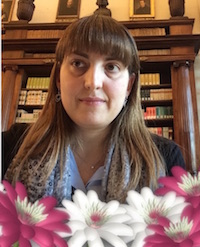Studying at the University of Verona
Here you can find information on the organisational aspects of the Programme, lecture timetables, learning activities and useful contact details for your time at the University, from enrolment to graduation.
Academic calendar
The academic calendar shows the deadlines and scheduled events that are relevant to students, teaching and technical-administrative staff of the University. Public holidays and University closures are also indicated. The academic year normally begins on 1 October each year and ends on 30 September of the following year.
Course calendar
The Academic Calendar sets out the degree programme lecture and exam timetables, as well as the relevant university closure dates..
| Period | From | To |
|---|---|---|
| I semestre (Lingue e letterature straniere) | Sep 28, 2020 | Jan 9, 2021 |
| II semestre (Lingue e letterature straniere) | Feb 15, 2021 | May 29, 2021 |
| Session | From | To |
|---|---|---|
| ESAMI LINGUE - sessione invernale | Jan 11, 2021 | Feb 13, 2021 |
| ESAMI LINGUE - sessione estiva | May 31, 2021 | Jul 24, 2021 |
| ESAMI LINGUE - sessione autunnale | Aug 30, 2021 | Sep 25, 2021 |
| Session | From | To |
|---|---|---|
| LAUREE LINGUE - sessione autunnale (a.a. 2019/20) | Nov 2, 2020 | Nov 7, 2020 |
| LAUREE LINGUE - sessione straordinaria (a.a. 2019/20) | Apr 7, 2021 | Apr 13, 2021 |
| LAUREE LINGUE - sessione estiva (a.a. 2020/21) | Jul 5, 2021 | Jul 10, 2021 |
| Period | From | To |
|---|---|---|
| Festa di Ognissanti | Nov 1, 2020 | Nov 1, 2020 |
| Festa dell'Immacolata | Dec 8, 2020 | Dec 8, 2020 |
| Festa della liberazione | Apr 25, 2021 | Apr 25, 2021 |
| Festa del lavoro | May 1, 2021 | May 1, 2021 |
| Festa del Santo Patrono | May 21, 2021 | May 21, 2021 |
| Festa della Repubblica | Jun 2, 2021 | Jun 2, 2021 |
Exam calendar
Exam dates and rounds are managed by the relevant Foreign Languages and Literatures Teaching and Student Services Unit.
To view all the exam sessions available, please use the Exam dashboard on ESSE3.
If you forgot your login details or have problems logging in, please contact the relevant IT HelpDesk, or check the login details recovery web page.
Should you have any doubts or questions, please check the Enrollment FAQs
Academic staff
 angela.albanese@univr.it
angela.albanese@univr.it
 benedetta.binacchi@univr.it
benedetta.binacchi@univr.it
 elisa.destro@univr.it
elisa.destro@univr.it
 alice.fiorentino@univr.it
alice.fiorentino@univr.it
 sara.paolini@univr.it
sara.paolini@univr.it
 alberto.scandola@univr.it
alberto.scandola@univr.it
 massimo.scotti@univr.it
massimo.scotti@univr.it
 silvia.zollo@univr.it
silvia.zollo@univr.it
Study Plan
The Study Plan includes all modules, teaching and learning activities that each student will need to undertake during their time at the University.
Please select your Study Plan based on your enrollment year.
1° Year
| Modules | Credits | TAF | SSD |
|---|
1st foreign language2nd foreign language1st foreign literature2nd foreign literature1 module to be chosen between the following2° Year activated in the A.Y. 2021/2022
| Modules | Credits | TAF | SSD |
|---|
1st foreign language2nd foreign language1st foreign literature2nd foreign literature1 module to be chosen between the following3° Year activated in the A.Y. 2022/2023
| Modules | Credits | TAF | SSD |
|---|
1st foreign language2nd foreign language1st foreign literature2nd foreign literature1 module among the following (philology related to 1st or 2nd foreign language)1 module between the following| Modules | Credits | TAF | SSD |
|---|
1st foreign language2nd foreign language1st foreign literature2nd foreign literature1 module to be chosen between the following| Modules | Credits | TAF | SSD |
|---|
1st foreign language2nd foreign language1st foreign literature2nd foreign literature1 module to be chosen between the following| Modules | Credits | TAF | SSD |
|---|
1st foreign language2nd foreign language1st foreign literature2nd foreign literature1 module among the following (philology related to 1st or 2nd foreign language)1 module between the following| Modules | Credits | TAF | SSD |
|---|
Legend | Type of training activity (TTA)
TAF (Type of Educational Activity) All courses and activities are classified into different types of educational activities, indicated by a letter.
Spanish literature 1 (2020/2021)
Teaching code
4S008345
Teacher
Coordinator
Credits
9
Language
Italian
Scientific Disciplinary Sector (SSD)
L-LIN/05 - SPANISH LITERATURE
Period
II semestre (Lingue e letterature straniere) dal Feb 15, 2021 al May 29, 2021.
Learning outcomes
The main objective of the course (within the Degree in Foreign Language and Literatures) is the acquisition of advanced skills in the field of Spanish literature from 18th to 21st Centuries. The expected learning outcomes are as follows: - Knowledge and understanding: a depth knowledge of the Spanish literature of the considered period: historical context, texts, genres, movements and authors taught in the course, with particular regard to the issues of cultural exchange and the expressive differentiation of literary phenomena. - Applied knowledge and understanding skills: the student will acquire the meth-odologies necessary to work on literary texts in historical and comparative per-spectives and the ability to understand complex texts and implicit meanings.
Program
The coursewill provide the coordinates for the knowledge of the main movements, authors and genres of Spanish literature of the twentieth century. The topics planned are as follows:
- History: the Cuban crisis of '98, Primo ed Rivera, the Second Republic, Franco, the democratic transition
- Literature: the Avant-gardes, the Generation of '27, the novel during Franco's dictatorship, the of the Transition
- Texts: a selection of the major Spanish writers of the Twentieth Century is included in the Anthology uploaded to the e-learning portal. Detailed analysis of a novel (to be defined)
Teaching Mode: Teaching will take place in Italian and Spanish through frontal teaching, case studies and e-learning. The course will have an e-learning platform, which will contain mandatory contents and optional materials. For students who do not have a previous Spanish language education, we will consider the possibility of organizing support courses. This program is also valid for non-attending students who, however, are advised to contact the teacher during the reception hours. Throughout the academic year, the individual reception service managed by the teacher is available, at the timetable indicated on the web pages (no need to set a specific appointment).
| Author | Title | Publishing house | Year | ISBN | Notes |
|---|---|---|---|---|---|
| L. Rodríguez Cacho, | 3 Manual de historia de la literatura española. Vol. II, Siglos XVIII al XX, Castalia | Castalia | 2017 | Manuale facoltativo e limitatamente ai capitoli sul Novecento (pp. 241-326; 379-548): utile per approfondimenti e come alternativa al manuale in italiano (Letteratura spagnola contemporanea) per gli studenti che intendono preparare il programma in spagnolo. | |
| Ignacio Martínez de Pisón | Carreteras secundarias | Seix Barral | 1996 | obbligatorio | |
| Stefano Neri | Dispensa e antologia del corso sul portale E-learning | 2021 | obbligatorio | ||
| Julio Valdeón, Joseph Pérez, Santos Juliá | Historia de España | Austral | 2005 | Manuale facoltativo: la parte relativa al Novecento (pp. 469-578) è utile per approfondimenti e come alternativa al manuale in italiano (Il Franchismo) per gli studenti che intendono preparare il programma in spagnolo. | |
| Giuliana Di Febo; Santos Juliá | Il franchismo | Carocci | 2003 | obbligatorio | |
| D. Manera, M. Bianchi, G. Calabrese, S. Cattaneo, S. Trecca | Letteratura spagnola contemporanea | Pearson | 2020 | Obbligatoria la parte 1 (pp. 1-272) | |
| Ángel Prieto de Paula; Mar Langa Pizarro | Manual de literatura española actual | Castalia | 2007 | 9788497402361 | Manuale facoltativo: utile per approfondimenti e per gli studenti che intendono preparare l'esame in spagnolo. |
Examination Methods
The exam takes place in Italian and Spanish and consists of an interview aimed at verifying the depth and breadth of the matured knowledge, the analytical and argumentative ability, the ability to systematically connect knowledge, the property of language. The exam covers the topics covered throughout the program. Students will have the opportunity to take an informal and optional written exam based on the blocks of history and literature (open questions and multiple-choice tests). For those who get a positive result for this test, the oral exam will only focus on the text commentary (reading, translating, contextualizing, analyzing a text fragment).
Type D and Type F activities
To discover all the teaching activities accredited by the foreign teaching college click here
Career prospects
Module/Programme news
News for students
There you will find information, resources and services useful during your time at the University (Student’s exam record, your study plan on ESSE3, Distance Learning courses, university email account, office forms, administrative procedures, etc.). You can log into MyUnivr with your GIA login details: only in this way will you be able to receive notification of all the notices from your teachers and your secretariat via email and soon also via the Univr app.
Student login and resources
Gestione carriere
Assegnazione tutore
Attività accreditate D/F
Calendario didattico dettagliato
Cambio lingua curriculare
Competenze informatiche
Competenze linguistiche (prima e seconda lingua)
Competenze linguistiche in triennale (terza lingua CFU F)
Compilazione del piano didattico
Corso di Lingua portoghese
Erasmus+ e altre esperienze all'estero
Linguistic training CLA
Presentazione dei corsi di studio e Open day
Graduation
Saperi minimi
Stage e tirocini
Le attività di stage sono finalizzate a far acquisire allo studente una conoscenza diretta in settori di particolare interesse per l’inserimento nel mondo del lavoro e per l’acquisizione di abilità professionali specifiche.
Le attività di stage sono svolte sotto la diretta responsabilità di un singolo docente presso studi professionali, enti della pubblica amministrazione, aziende accreditate dall’Ateneo veronese.
I crediti maturati in seguito ad attività di stage saranno attribuiti secondo quanto disposto nel dettaglio dal “Regolamento d’Ateneo per il riconoscimento dei crediti maturati negli stage universitari” vigente.
- Tutte le informazioni in merito agli stage per futuri studenti sono disponibili alla pagina Stage e tirocini.
- Tutte le informazioni in merito agli stage per studenti iscritti sono pubblicate in MyUnivr - come fare per - stage e tirocini.
- Tutte le informazioni in merito agli stage per le aziende sono disponili alla pagina Stage e tirocini per azienze.
Ulteriori informazioni al seguente link https://www.univr.it/it/i-nostri-servizi/gestione-carriere-studenti-lingue-e-letterature-straniere/stage-e-tirocini-lingue-e-letterature-straniere


 +39 045802 8409
+39 045802 8409
















































